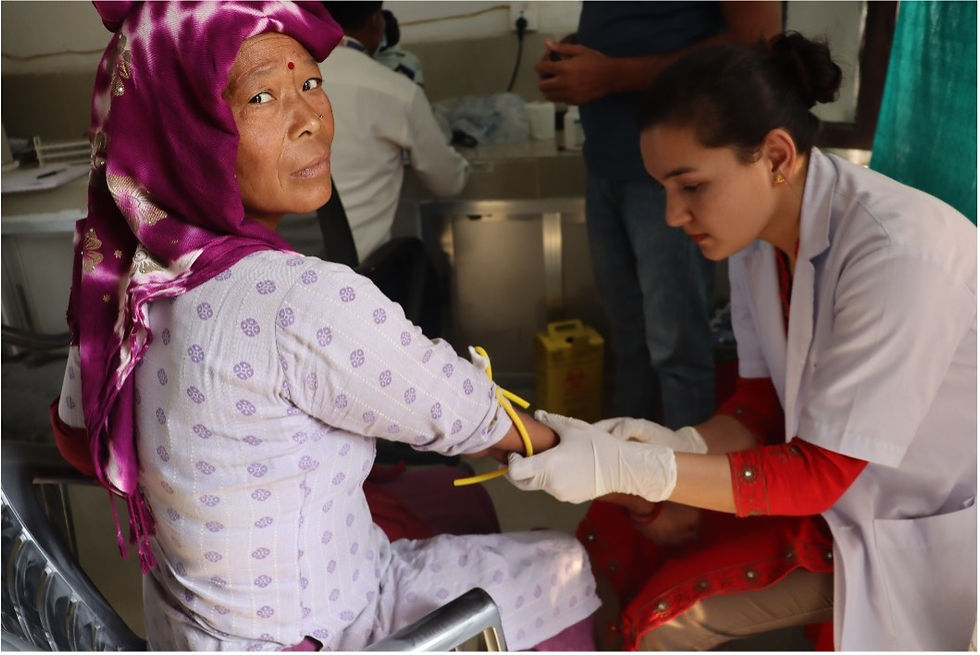World Menstrual Hygiene Day
- Dinesh Raj Sapkota
- May 29, 2023
- 3 min read
What is Menstrual Hygiene?

Menstrual hygiene refers to the practices and measures taken to ensure the cleanliness, comfort, and health of individuals during menstruation. It encompasses various aspects of personal hygiene, sanitation, and the management of menstrual products. Maintaining good menstrual hygiene is important for the well-being, dignity, and overall health of people who menstruate.
The theme of Menstrual Hygiene according to 2023, is “Making menstruation a normal fact of life by 2030”. Menstrual hygiene should be taught to every girl so that she can have a smooth and healthy life during menstruation. Poor menstrual health can lead to so many health complications, but with regular hygiene, we can keep them away. Happy Menstrual Hygiene Day!
History of Menstrual Hygiene Day :

Menstrual Hygiene Day is observed every year on the 28th day of the fifth month because the menstrual cycle averages 28 days in length and people on average menstruate for five days each month. This year the theme was “ Making menstruation a normal fact of life by 2030 ” and the hashtag is #we've recommitted. Menstrual hygiene is essential to Girl's and Women’s health and well-being.
Celebrating World Menstrual Hygiene Day in Gadhawa :

World Menstrual Hygiene Day was celebrated in Gadhawa on 29th May 2023 in coordination with Creating Possibilities Nepal (CP Nepal) and Janata Higher Secondary School of Gadhawa, Dang.
On this occasion, CP Nepal conducted an awareness program on menstrual hygiene among teenage girls. The participants in the program said that since there is a way to enable women to start their menstrual life, there should be a discussion about its cleanliness in families and schools.
Sangita Parajuli :

She is 13 years old and a student at Janta School. She shared her opinion with us in the session. She said, " The most important thing during our period is hygiene. During this period we should take care of our bodies and eat healthy food. Also today I learned about medication, paracetamol is the safest medicine to use if we have too much pain. She said all the things she learned will help her in life."
Jenisha Pun Magar:

Jenisha Pun Magar is a student of Janta School. She is 16 years old and studies in class 10. She also participated in a menstrual hygiene day session. She shared her opinion with us and she said " Today I learned a very important thing that we should change our pad every 3 - 4 hours. Before this session I was doing wrong I used to change my pad only once in a whole day. But today I learned that can lead to serious infections and disease. And, during the period we should eat healthy food and clean our body, and environment to be hygienic."
Prasuna Pandey:

Similarly, Prasuna Pandey, a class 10 student, said that since there are still superstitions in the household during menstruation, it would be more effective if there is a discussion about its cleanliness in the household and school to make it dignified. She also talked about how hard it is in her home when she is on period. She said, "During the period, I can't enter in kitchen or temple and I can't touch my brother or dad. These are followed by our grandmother, mom, and me. But these are superstitions and we need to end this kind of thinking from our home and community. I believe the most important thing is that we have to be hygienic throughout the period."
On this occasion, information was also given about the menstrual cup.
Session About Menstrual Hygiene :

Fifty-Five girls participated in this session which was facilitated by women's health coordinator Pressa Chaudhary and adolescent education facilitator Sita Kumal.

Similarly, the day started to celebrate at the international level in 2014 and started to celebrate in Nepal by 2015. The purpose of this day is to empower all women around the world to make their menstruations safe and clean by solving the issues.
Additionally, Pressa addressed cultural taboos, stigmas, and misconceptions surrounding menstruation. She introduced Saalt Cup to the girls. It's a small, reusable cup made of medical-grade silicone or other materials that is inserted into the vagina to collect menstrual blood. She taught them how to use it and told them the benefits of it.
Conclusion :
In conclusion, maintaining menstrual hygiene practices is crucial for the overall health and well-being of every woman. Poor menstrual hygiene can lead to several consequences such as infections and impact on reproductive health. To promote and improve menstrual health management, education, improved access to menstrual products, addressing social stigma, and involvement of communities and government plays a vital role.
Her International, Canada, The Relly Health Company, UK, and Humani Trail, Switzerland supported this event.









Comments